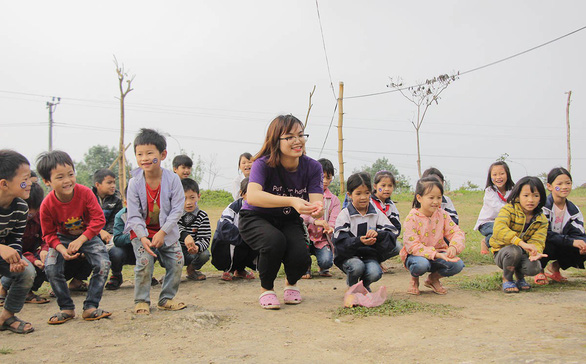Community-based tourism is being introduced to poor localities in northern Vietnam in an effort to provide them with a sustained source of income, so as to significantly improve their quality of life.
Instead of building facilities, roads, and schools, a group of youngsters chose to help poor regions with tourism potential to practice community-based tourism, which requires very little investment yet is attracting a growing number of tourists.
In order to prepare the community for the new form of livelihood, these youngsters also teach English and other subjects to children of the regions.
Members of the Volunteer for Education Organization (VEO) not only acknowledge their responsibility with the society, they also do it out of their generous hearts.
New form of tourism
The combination of travel and volunteerism is what VEO has been pursuing for the past five years.
VEO members get to travel to distant regions with breathtaking sights no other places have, where they also help the local residents.
Until now, hundreds of volunteers have participated in the volunteering activities the organization held helping people in northern communes and provinces such as Ha Giang Province, Ban Gioc Waterfall in Cao Bang Province, Sa Pa in Lao Cai Province, and Mu Cang Chai Commune in Yen Bai Province, among others.
In these regions, youngsters work with local authorities to instruct the residents on how to practice community-based tourism, usually starting with making adjustments to the houses to turn them into a sufficient homestay spots to welcome tourists, while the organization also holds activities showing the locals how to improve the visitors’ experience and classes to teach English.
VEO co-founder and managing director Nguyen Huyen Phuong admits the difficulties she had introducing “volunteering tourism” to the young when she first started it in June 2013.
“When the young have a chance to go to undeveloped regions and see how much the people there want to turn their lives around, the participants realize their own responsibilities with the society and learn to share more,” the managing director said, adding that it is a great opportunity for the youngsters to develop themselves.
At first the volunteers who registered to participate in the trip also had to pay a participation fee to cover the transportation, accommodation, and meals.
The more trips the organization held, the more hope they had as many places significantly changed only after four to five months of working with VEO even though most residents there are ethnic minorities who have little understanding of the modern economy and markets.
The locals advised one another to constantly maintain and improve their homestays, children to be keenly studying English, and advertise the experiences available in the region, attracting an increasing number of tourists.
“At first, the locals were confused to see the visitors coming here to teach but we came monthly so they had grown accustomed to us,” Thuy Quynh, coordinator of one of VEO’s projects, said.
Teaching English and soft skills
Beside instructing locals on how to attract tourists, the organization also teaches children English so they can be able to communicate with foreign tourists.
Whenever children get to interact with English through listening and reading activities, they get excited and enthusiastically participate in the activities.
In mountainous regions, students usually do not have access to foreign languages and soft skill education, so the organization tries to make up for what the children lack.
“We bring literacy to the ethnic minorities through English curricula, science, skills, and history,” Quynh said.
“VEO’s way of teaching also helps the children develop a passion for reading and dreams,” she added.
After many visits to the regions, the locals started growing accustomed to the volunteers and at the sight of the organization’s purple shirt, one could hear loud voices from afar shouting “VEO volunteers are here."
“Next time, you should come more often,” Trieu Quoc Dat, a third grader in Hong Thai Commune, Tuyen Quang Province, said after a VEO class he attended.
He was one of the most active students of VEO’s English class, with his accurate pronunciation that brought him the greatest number of gifts among his peers.
The volunteers believe teaching children English plays an important part in improving the service quality people in the regions can provide while exercising community-based tourism.
Established in June 2013, VEO is a non-governmental organization, creating a network of volunteers all over the world to help the poor through education programs.
Currently, the organization is only active in northern Vietnam but it has plans to expand to the southern part of the country to connect more volunteers who share the same vision.
Like us on Facebook or follow us on Twitter to get the latest news about Vietnam!


















































